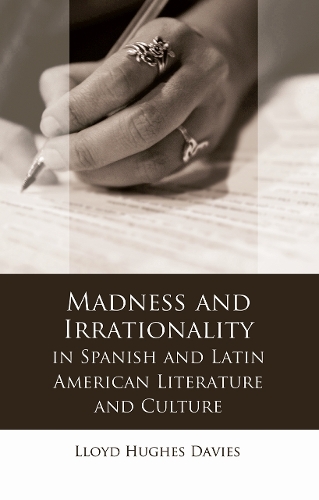
Madness and Irrationality in Spanish and Latin American Literature and Culture
(Paperback)
Publishing Details
Madness and Irrationality in Spanish and Latin American Literature and Culture
By (Author) Lloyd Davies
University of Wales Press
University of Wales Press
8th September 2020
United Kingdom
Classifications
Professional and Scholarly
Non Fiction
860.93561
Physical Properties
Paperback
272
Width 138mm, Height 216mm
Description
This is the first monograph to consider the significance of madness and irrationality in both Spanish and Spanish American literature. It considers various definitions of madness and explores the often contrasting responses, both positive (figural madness as stimulus for literary creativity) and negative (clinical madness representing spiritual confinement and sterility). The concept of national madness is explored with particular reference to Argentina, where the countrys vast expanses have been seen as conducive to madness, while the urban population of Buenos Aires is especially dependent on psychoanalytic therapy. The discussion considers both the work of lesser-known writers such as Nuria Amat, whose personal life is inflected by madness, and that of larger literary figures such as Jos Lezama Lima, whose poetic concepts are suffused with the irrational. The conclusion draws attention to the other side of reason as a source of possible originality in a world dominated by the tenets of logic and conventionalised thinking.
Reviews
Drawing on Nietzsches comment that Plato was speaking for the whole of humanity when he said: From madness Greece has derived its greatest benefits, and Virginia Woolfs insight that as an experience, madness is terrific, Lloyd Daviess new book is a fantastically comprehensive study of madness and irrationality in Spanish and Latin American literature and culture. This is a cornucopia of madness withas you might expectexamples of Quixotic madness, but we are also regaled with tales of clinical madness, political madness (the locas of the Plaza de Mayo), Baroque madness, cultural madness, linguistic madness, feminist madness, criminal madness, homosexual madness, existential madness, and even bookish madness. Full of original insight and penetrating readings!
-- Stephen M. Hart, University College London
This is a remarkably wide-ranging and cultivated book, which manages to be very focused and detailed. As a study of madness as played out in culture and in Spanish and Spanish American literature in particular, it effortlessly interweaves Hispanic thought and expression with other European and Anglo-American approaches. The author offers a theory of madness in an explicitly Hispanic context, focusing compellingly on Spains mythical foundations and the prosecution of the idea of a Spanish nation via exclusionary rhetoric, and on various forms of national madness in Latin America linked to debates about Civilisation and Barbarism, violence and terror. A series of interpretative readings of literary texts manifest different aspects of the discourse of madness, covering thematic aspects such as history, politics, resistance to patriarchy, literature, reading and writing, joy and imaginative freedom, the existential, and the pursuit and problematisation of reality and truth.
-- Philip Swanson, University of Sheffield
Author Bio
Lloyd Hughes Davies is Assistant Professor in the Department of Modern Languages, Translation and Interpreting, Swansea University. His main area of interest is contemporary Spanish American literature, particularly the novels of Argentina and Colombia.
